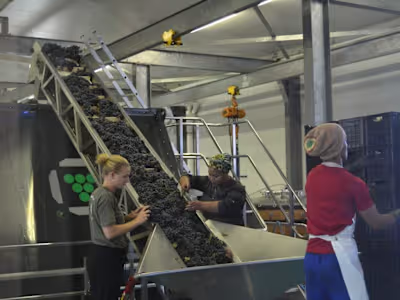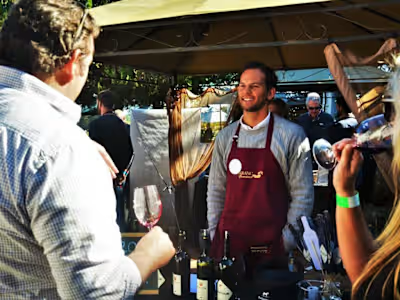Don't Demonize the Dream
Lately, I have immersed myself in the Jordan B Peterson Bible Series podcast. In his series of podcasts he breaks down and analyses the central themes and stories found within the Bible. His background, for those who may not have heard of him before, is in clinical psychology. Here's a link for more information: https://www.jordanbpeterson.com/about/
An element of one the themes I wanted to focus on today was highlighted in the story of Cain and Abel. For the purposes of this article, I'll keep the description of the story brief but it should by no means be taken lightly or summed up in one, foul swoop. Cain and Abel were brothers (their parents being Adam and Eve). Cain was the first born and Abel was the younger, more successful or, favorable of the two. Jealousy arose and Cain consequently murdered his brother.
Naturally, there are volumes of information that we can draw from this story and Peterson's lectures, namely, the idea of Good and Evil that exists within each person and the overarching idea that we have to understand and accept the 'bad' within us and actively choose to go against it. Only once you fully understand that you have the potential to create diabolical havoc and chaos (not only for yourself, but for everyone around you), can you move forward and try to forge a path to truth and order.*
Let's imagine the following scenario: you're an athlete or someone who really enjoys sport; perhaps running or cycling. You consider yourself to be of above-average ability and regularly work hard to improve your craft, you've had a small taste of success in the past and in some way you'd really like to make this interest a significant part of your life. Perhaps after a steady upward trajectory of dedication and perseverance, you may achieve a relative amount of success or praise from within this community.
In that same circle of influence, let's say, a sports YouTuber you follow or someone you know from within the discipline, regularly shares their achievements and progress (either you follow them willingly, or you search for their information). Obviously, you follow this athlete because there are certain things you can learn from them or areas where they are further along the path that you aspire towards. You're both interested in the same thing, but at different points on the road. Maybe they get to enter into more prestigious competitions, they receive sponsored gear, their stats on Strava or Zwift are better and they have a large following on social media or influence a significant number of people. And to top it off, they're approachable and humble.
You both share a love for the sport, dedicate as much time as you both can, according to what your schedules will allow, but right now, you're painfully aware that you're behind in comparison. What is there stopping you from feeling resentful, a tinge of jealousy or perhaps even a secret hope that they might get an injury? In your mind, while watching or reading up on their content you imagine what their private lives might be like or the personal relationships that they have or how they act as human-beings when no one is watching. Slowly but surely, you may start to decide or believe that they have used methods to get where they are that are not completely honest or earnest. You might start to believe that they have stepped on others to reach the level of success that they currently have or that they have a severe imbalance within the different spheres of their lives.
Before you know it, you've written them off; they are no longer a source of inspiration and you have secretly discarded them into the category of "sell-out" or "fake". Believing on some level that there is no legitimate merit in what they have accomplished.
The mentality here is that "There's no way he could have done that and still managed to... [insert goal]". Or, "She probably... [insert hypothetical unrealistic sacrifice] , which is why she is so much fitter than me right now". Or let's not forget about the: "Oh it's all fine and well, but let's just see five years down the line if he can keep this up.".
All of these ideas are crippling and useless. They're unproductive for a multitude of reasons.
Cain hated his brother; he couldn't stand that he was more likable, more accepted and generally more successful. Perhaps somewhere deep down Cain wanted to be his brother, or at least, be very much like him. But because of all these evil things he had imagined and concocted about his brother in his mind, who he had regarded as the most prosperous ideal, the image at the top of the pile, he deeply hated and resented the very thing he wanted to be. He wanted to destroy the very same thing he unknowingly strove towards. Jealousy got the better of him and not only did he lose his brother, but he also killed off the ultimate symbol of goodness, victory or righteousness which he was aiming toward. He crushed his own dream. After committing the ultimate crime, he was also left with no role model or hope for better.
How often do we do that to ourselves?
We look up to others (or perhaps to a time in our own lives where we have reached a significant milestone) and during times of struggle, hardship or complication, we make excuses for, or discredit those who have conquered the things we have yet to achieve. We write those people off as 'crazy' or 'obsessive' or people who have more money or resources to dedicate to what we want. We conjure up outlandish daydreams and parallel universes where we take matters into our own hands and level the playing field to a realm where "Yeah, I would be just as good, if not better were it not for...[insert pathetic excuse].". Consequently, you dismiss the possibility of yourself ever being able to achieve that goal, you trick your brain into making a negative association with success and therefore deny or kill the ideal you are working towards.
This has been an incredible revelation for me. Realizing this truth has already healed so many dangerous, dark thoughts. It opens up an endless possibility of new paths for me to take and breaks the boundaries I have placed on my own and others' capabilities.
We will never truly know what is inside the mind of the person we aspire to be like; we interpret using a plethora of complex filters and lenses determined by our circumstances, position in the world and by our position in time and space, among others. So the best shot we have, both to be respectful towards our own ideal and ourselves (on the mission towards the highest order) is by:
Giving our ideal the benefit of the doubt.
SO WHAT?!, if the ideal is secretly obsessive or has done shady things to get to where they are? In reality, if it turns out to be this way and we always believed in the most sincere version of the ideal, we won't be accused or held accountable for their actions. All that we would have gained is this: The hopeful trust in the future/ possibility and pushing ourselves to our unknown limits in order to make the very best of what have. Ultimately, if you place your hope or ideal in something that strives towards higher truth or order or positive potential, believing in the best qualities of it can only impact you positively.
If you were to be completely honest, does it directly impact YOU that Lance Armstrong used performance-enhancing drugs? Is his ability or actions directly connected to your physical capabilities or are you hindered in any way by what he does? No. Is it fair to suggest that a determined Cancer patient who went on to becoming one of the world's fittest and strongest cyclists could consequently be a symbol of hope for people who had little to no inspiration to overcome their own battles? I think so. You cannot overlook the entire astonishing story just because of an inevitable tendency of humans to make errors in judgement. Just because the truth surfaced, doesn't mean that the mortality rate of Cancer patients increased. Respectfully, people weren't suddenly going to die in higher numbers because it turned out that Lance wasn't truthful about his cycling career.
On the contrary, due to the fact that he was interviewed throughout his career and time in the public eye, he happened to share a story about chemotherapy and how one of the possible side-effects included becoming sterile or infertile. A fellow cancer patient, who, at the time was not made aware by her doctor about these specific side-effects, happened to watch and learn from Lance Armstrong's interview and therefore did the necessary research to book an appointment to freeze her own eggs before undergoing chemotherapy. According to the documentary "Lance" (2020), thousands of babies from Cancer patients were born because they were able to take steps in order to plan families after chemotherapy. Of course I am not suggesting that it is solely due to Lance Armstrong that all of these children were born but merely that, at least one person, in this specific scenario has come forward and was able to take away vital information from his experience or influence. Not to mention the lives he touched as part of the Livestrong Foundation or countless others who learned of his story. Perhaps this statement is too emotional or opinionated but it is true that not every professional cyclist has (in his or her career) created a non-profit medical foundation.
Lastly, on the note of Lance Armstrong, one could indeed argue that what he did also caused an enormous amount of pain and negative repercussions for many involved in his sponsor partnerships, riding teams, foundations and personal life etc. But the error here is that people tend to disregard the sheer scale of the positive effect he had. More importantly, people tend to forget that everyone makes catastrophic mistakes. Some are private citizens while others are public figures. It is extremely unfortunate for some that their faults are scrutinized and deconstructed into microscopic detail when some of the people doing this may have made terrible mistakes of their own-- with a significantly smaller audience.
We all have to take the path of redemption; whether it be for personal, spiritual reasons or to carry on as a valuable, functioning member of a family, community or, at a larger scale, society, who can again be trusted. In my opinion, a mistake (whatever the scale) is an opportunity to redeem yourself. Asking for forgiveness is equally as important as being able to forgive. You won't receive the one without the other.**
The takeaway from this lesson for me is; don't demonize or break down your ideals. Believe in their best qualities. Stand firm in the higher Truth which you want to attain (and that which governs you) and assume that the thing which you strive towards has the harmony of all the best qualities you envision it has and those which you want for yourself. This is way to making the most of who and what you are.
¬END¬
Notes:
*I can't take full credit for these statements; a large portion is in homage to JBP and consequently, Carl Jung whom he refers to throughout his lectures. I'll link the podcast episode for the purposes of reference for further discussion and insight. Each episode, in my opinion has been extremely rewarding and enlightening. https://www.jordanbpeterson.com/podcast/s3-e5-biblical-series-cain-and-abel-the-hostile-brothers/
**Though I do take the position on defending Lance Armstrong, I also believe that he needs to accept and forgive Floyd Landis, the person who blew the whistle. You cannot receive forgiveness if you can't forgive.
Like this project
Posted Dec 29, 2024
Lately, I have immersed myself in the Jordan B Peterson Bible Series podcast. In his series of podcasts he breaks down and analyses the central themes and stor…
Likes
0
Views
2



